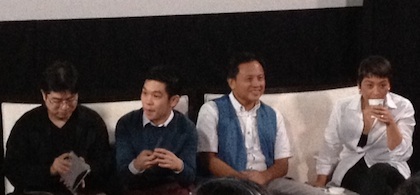SUMMARY
This is AI generated summarization, which may have errors. For context, always refer to the full article.
Editor’s Note: This piece was originally published in The New Media, a web magazine that tackles how technology can radically change the pulse of business, marketing, and life. It is republished here with permission from Carlo Ople, the editor-in-chief of TNM.
MANILA, Philippines – Journalists from various networks affirmed the value of social media to their work during the Social Good Summit on September 22.
Ces Drilon, Howie Severino, Michael Josh Villanueva, and JV Rufino cited different examples during their individual 10-minute presentations. It was interesting to hear their views and opinons but all of them basically were in agreement that you cannot ignore social media any more and that news organizations have to embrace the medium and make the most of it.
From a sausage factory to an open kitchen

Inquirer.net’s JV Rufino shared that prior to social media, newsrooms were like sausage factories. Not in the sense that they were all men (lol) but because the general public didn’t know how the news was gathered. They just got it in the morning when they would take out and read the newspapers.
Now social media has forced newsrooms to work like open kitchens wherein the general public has an idea of what’s happening inside.
Intersection of journalism and advocacy
Ces Drilon, a staunch advocate of the RH Bill, revealed that ABS-CBN has prohibited her from reporting on the controversial bill because she announced her support for it via Twitter. Since then she’s been openly campaigning for the passage of the bill on Twitter and this has attracted a lot of detractors online.
For her work as reporter, Ces revealed that Twitter has definitely helped her pursue sources and leads. Eventually some of these efforts would blossom into a full news report, like her story on the New Zealand earthquake.
Drilon ended her 10-minute talk by saying that she hopes Twitter will be the intersection of her being an advocate and a journalist.
Value of crowdsourcing
Rappler’s Michael Josh zeroed in on the potential of crowdsourcing. He talked mostly about the Mood Meter function of the site as well as their ambitious “infectious diseases” mapping project.
Note: This was the first time I’ve seen Josh speak in public and he definitely has a bright future ahead of him.
Debate is over, we can now break stories on Twitter
Howie Severino took the stage and proclaimed that the debate on whether you can or cannot break stories on Twitter is now over.
He shared that networks have no choice because if they don’t, they’ll get left behind (not even by competitors but by the general public).
Howie also discussed the challenge this new paradigm brings: vetting.
They get a lot of reports via social media through their YouScoop program and they need to make sure that what they report is not “edited” or false information.
See also: MMDA emphasizes importance of listening on Social Media
Public wants journalists to have an opinon?
During the open forum, Communications Undersecretary Manolo Quezon III raised an important point. He said that the lines between traditional reporting and commentary is blurring because the public is insisting on it via social media.
I partially agree with this since there is a tendency for people on Twitter and Facebook to focus not just on the message but also on the messenger.
However, I still think that journalists have to be as fair as possible when it comes to reportage and avoid commentary.
See also: Cybercrime takes center stage in Social Good Summit
Social media’s time is now
TV5′s and The New Media’s EIC Carlo Ople (To clarify: he is a digital marketer not a journalist) also took the stage and shared points on how social media empowered individuals and how collaboration was key in maximizing the potential of this medium.
A quote he cited from Victor Hugo pretty much summed up the initial half of the morning session of the Social Good Summit: An invasion of armies can be resisted, but not an idea whose time has come.
Social media’s time is now. – Rappler.com
More about #iPHLGood, the Social Good Summit in Manila
Morning Session: The Dialogue
Afternoon Session: The Summit
- Where we rediscover ourselves and others by Mon Jimenez
- MMDA and Chris Lao: The importance of listening on social media
- 10 Twitter rules I try to follow by Bianca Gonzalez
- IN PHOTOS: The Social Good Summit
Add a comment
How does this make you feel?

There are no comments yet. Add your comment to start the conversation.